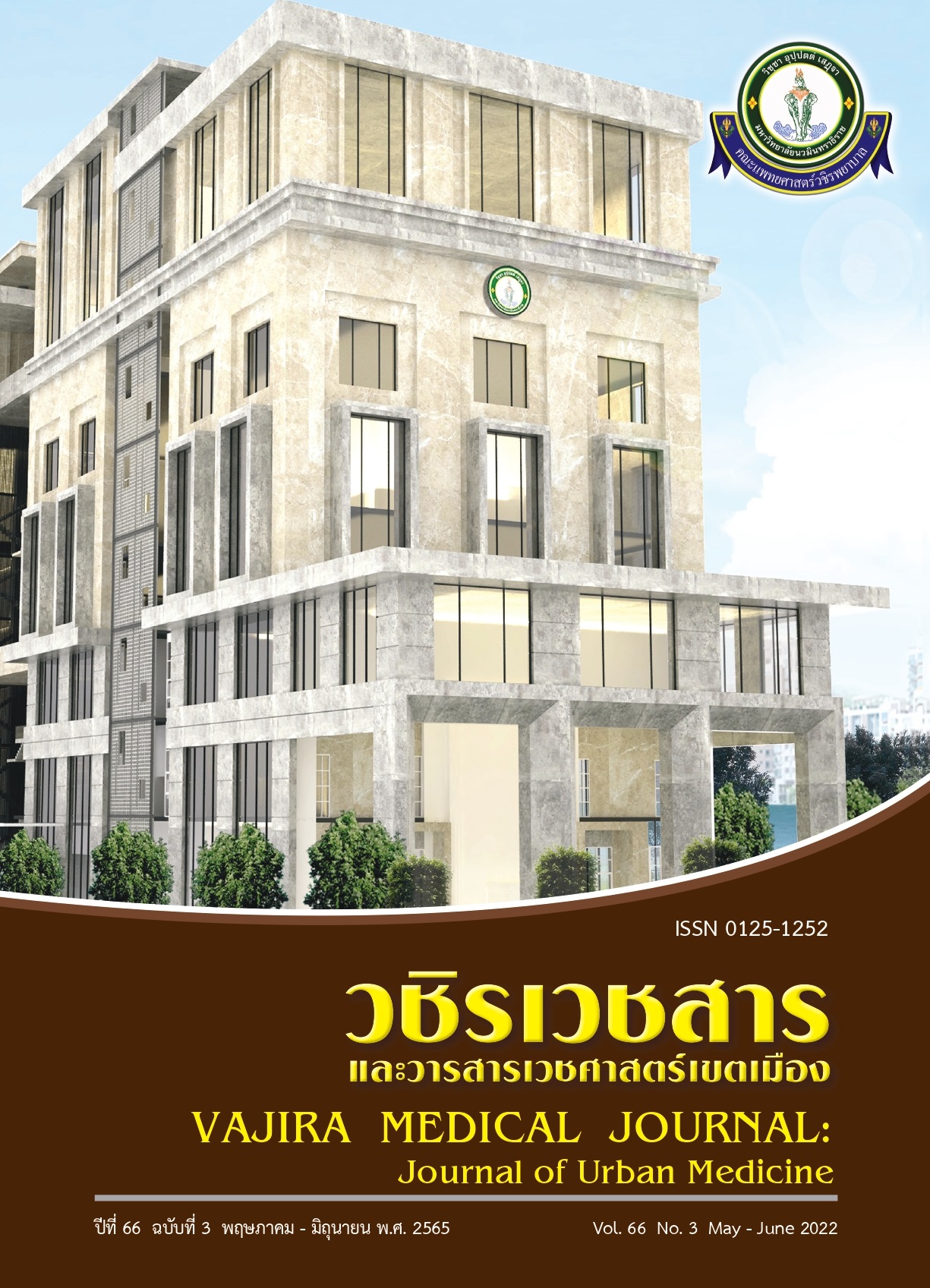Prevalence of PD-L1 Expression in Patients with Advanced Non-Small Cell Lung Cancer Treated in Vajira Hospital
Main Article Content
Abstract
Objectives: Advanced non-small cell lung cancer (NSCLC) is one of the world-wide most common newly diagnosed cancer and cause of cancer deaths. Platinum-based chemotherapy was the backbone of management until an immune checkpoint inhibitor (ICI) as monotherapy or combination with chemotherapy is demonstrated survival benefits over chemotherapy. Program cell death ligand -1 (PD-L1) expression is still the best, even though not perfect biomarker of response to an ICI. This study was intended to determine the prevalence of PD-L1 expression among Thai advanced NSCLC patients.
Methods: The investigators performed a descriptive study of patients with advanced NSCLC who had formalin-fixed paraffin-embedded (FFPE) tissue specimens available, in January 1, 2016 to December 31, 2018, in the Department of Anatomical Pathology, Faculty of Medicine Vajira Hospital, Navamindradhiraj University. The baseline patients’ demographics were collected. The PD-L1 expression was determined by the PD-L1 IHC 22C3 pharmDx qualitative immunohistochemical assay. The primary endpoint was to assess the prevalence of PD-L1 expression (TPS >1%) among patients with advanced NSCLC. The secondary endpoints were to find out its correlation with demographics and independent factors of 1-year survival.
Results: There were 79 NSCLC patients who had FFPE tissue specimens available. However, only specimens from 35 patients had adequate quality for PD-L1 analysis. Only three of them (8.6%) had PD-L1 expression. No baseline demographics was associated with its expression. ECOG performance status was the only independent determining factor of 1-year survival. (SR 75.42, p-value < 0.001)
Conclusion: Unexpected low prevalence of PD-L1 expression was demonstrated. The inadequacy of tissue specimen would be the obstacle of PD-L1 analysis. The investigators remind the clinicians that the proper amounts of tumor samplings are suggested for further biomarker analysis.
Downloads
Article Details

This work is licensed under a Creative Commons Attribution-NonCommercial-NoDerivatives 4.0 International License.
References
Sung H, Ferlay J, Siegel RL, Laversanne M, Soerjomataram I, Jemal A, Bray F. Global Cancer Statistics 2020: GLOBOCAN Estimates of Incidence and Mortality Worldwide for 36 Cancers in 185 Countries. CA Cancer J Clin 2021;71(3):209-49.
World Health Organization International Agency for Research on Cancer. GLOBOCAN 2020: Estimated Thailand’s cancer incidence, mortality and prevalence in 2020 [Internet]. 2021 [cited 2021 May 9]. Available from: http://gco.iarc.fr
Stinchcombe TE. Targeted Therapies for Lung Cancer. In: Reckamp K, editor. Lung Cancer: treatment and Research . Switzerland: Springer ;2016. p165-82.
Shi Y, Au JS, Thongprasert S, Srinivasan S, Tsai CM, Khoa MT, et al. A prospective, molecular epidemiology study of EGFR mutations in Asian patients with advanced non-small-cell lung cancer of adenocarcinoma histology (PIONEER). J Thorac Oncol 2014;9(2):154-62.
Kim C, Liu SV. First-line EGFR TKI therapy in non-small-cell lung cancer: looking back before leaping forward. Ann Oncol 2019;30(12):1852-5.
Onoi K, Chihara Y, Uchino J, Shimamoto T, Morimoto Y, Iwasaku M, et al. Immune Checkpoint Inhibitors for Lung Cancer Treatment: A Review. J Clin Med 2020;9(5):1362.
Gandhi L, Rodríguez-Abreu D, Gadgeel S, Esteban E, Felip E, De Angelis F, et al. Pembrolizumab plus Chemotherapy in Metastatic Non-Small-Cell Lung Cancer. N Engl J Med 2018;378(22):2078-92.
Paz-Ares L, Luft A, Vicente D, Tafreshi A, Gümüş M, Mazières J, et al. Pembrolizumab plus Chemotherapy for Squamous NonSmall-Cell Lung Cancer. N Engl J Med 2018;379(21):2040-51.
Mok TS, Wu Y-L, Kudaba I, Kowalski DM, Cho BC, Turna HZ et al. Pembrolizumab versus chemotherapy for previously untreated, PD-L1-expressing, locally advanced or metastatic non-small-cell lung cancer (KEYNOTE-042): A randomised, open-label, controlled, phase 3 trial. Lancet 2019;393:1819–30.
Socinski MA, Jotte RM, Cappuzzo F, Orlandi F, Stroyakovskiy D, Nogami N, et al. Atezolizumab for First-Line Treatment of Metastatic Nonsquamous NSCLC. N Engl J Med 2018;378(24):2288-301.
Park S, Choi YD, Kim J, Kho BG, Park CK, Oh IJ, Kim Y-C. Efficacy of immune checkpoint inhibitors according to PD-L1 tumor proportion scores in non-small cell lung cancer. Thorac Cancer 2019;11:408–14.
Detterbec FC. The eighth edition TNM stage classification for lung cancer: What does it mean on main street? J Thorac Cardiovasc Surg 2018;155:356-9.
Agilent Dako. PD-L1 IHC 22C3 pharmDx Interpretation Manual – NSCLC. For in-vitro diagnostic use [Internet] 2018 [cited 2021 May 9]. Available from: http://www.agilent.com
Daniel WW. Biostatistics : a foundation for analysis in the health sciences. 6 thed. New York: Wiley, 1995.
Sorensen SF, Zhou W, Dolled-Filhart M, Georgsen JB, Wang Z, Emancipator K, et al. PD-L1 Expression and Survival among Patients with Advanced Non-Small Cell Lung Cancer Treated with Chemotherapy. Transl Oncol 2016;9:64-9.
Scilla KA, Rolfo C. The Role of Circulating Tumor DNA in Lung Cancer: Mutational Analysis, Diagnosis, and Surveillance Now and into the Future. Curr Treat Options Oncol 2019;20(7):61.
Aggarwal C, Abreu DR, Felip E, Carcereny E, Gottfried M, Wehler T, et al. Prevalence of PD-L1 expression in patients with non-small cell lung cancer screened for enrollment in KEYNOTE-001,-010, and-024(1060p). Ann oncol 2016;27 Suppl 6:vi359–78.
Dietel M, Savelov N, Salanova R, Micke P, Biigras G, Hida T, et al. Real-world prevalence of programmed death ligand 1 expression in locally advanced or metastatic non–small-cell lung cancer: The global, multicenter EXPRESS study. Lung Cancer 2019;134:174-9.
Azuma K, Ota K, Kawahara A, Hattori S, Iwama E, Harada T, et al. Association of PD-L1 overexpression with activating EGFR mutations in surgically resected nonsmall-cell lung cancer. Ann Oncol 2014;25(10):1935-40.


